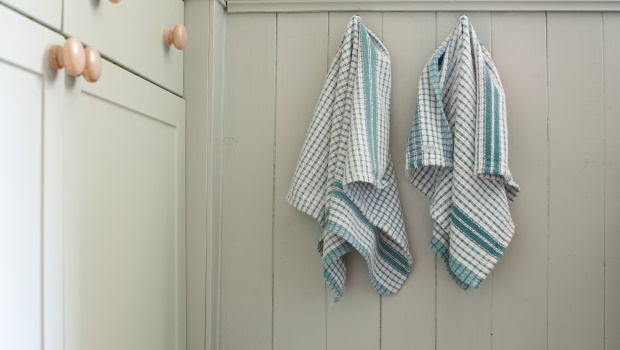
“Your dish towels could be making your family sick”, or “Beware your bacteria-laden kitchen towels”. These are just a few of the kitchen towel-related headlines doing the rounds this week.
The information prompting these doom-saying headlines was shared by the American Society for Microbiology, and it’s going to make you want to toss your dish towels into the washing machine immediately.
A cleaning staple in most households, we use dish towels for a range of things – from drying our hands and dishes to picking up hot pots and pans and wiping down counters. And they all add up – a team of researchers at the University of Mauritius tested 100 kitchen towels after one month of use and found half showed levels of bacterial growth normally found in or on the human body.
Of the 49 towels showing bacterial growth, almost three-quarters grew bacteria normally found in the intestines, such as E. coli and Enterococcus species, the study found. E.coli is a type of bacterium common in human and animal intestines, and while the majority of the strains are harmless some can cause severe food poisoning and serious infection. A further 14% of towels grew colonies of Staphylococcus aureus, often referred to as “staph” – a bacterium normally found on human skin and in the respiratory tract.
“In this study we investigated the potential role of kitchen towels in cross-contamination in the kitchen and various factors affecting the microbial profile and load of kitchen towels,” said Susheela D Biranjia-Hurdoyal, a senior lecturer at the University of Mauritius’ department of health. “Cross-contamination is happening in the kitchen, and those bacteria could reach our food and cause food poisoning.”
You’re facing higher risk if you’re not a vegetarian, as the study found meat-eating families were more likely to have bacteria-filled towels. And dish towels in homes with children or extended family members generally exhibited even more species of bacteria.
Bacteria were also more likely to be found on wet or humid towels than on towels that were hung out to dry. “Humid towels and multipurpose usage of towels should be discouraged,” Biranjia-Hurdoyal says. “Moist towels could be very important in promoting the growth of potential pathogens responsible for food poisoning.”
However, Popular Science magazine says we shouldn’t panic just yet. Even though the bacteria collected from dish towels aren’t stuff you want in your kitchen, we’re surrounded by bacteria in our day-to-day lives yet we stay relatively healthy. Additionally, half the towels sampled didn’t have any bacteria, so there’s a 50/50 chance your kitchen is one of the cleaner ones.
If you’re concerned about your family’s kitchen habits, here’s how to make sure you’re kept safe from harmful bacteria:
& Experts recommend you replace your kitchen towels daily, or at least on days you’ve been cooking, and rather use disposable cloths or paper towels which will help to stop the spread of bacteria in your kitchen.
& Reusable cloths should be disinfected or washed at 60? after each use, the BBC’s website advises.
& Ensure food preparation surfaces are clean before use, and use separate chopping boards for uncooked food – one for raw meat and another for food that doesn’t need cooking, for instance.
& To avoid wet towels, which are the perfect breeding ground for harmful bacteria, hang towels somewhere they’ll get a chance to dry between uses, Popular Science suggests.
& According to a US-based food safety authority, washing your hands is the first step to avoid spreading bacteria around your kitchen. Dirty hands can contaminate your kitchen towels with bacteria that’ll stay on them, contaminating any surface they touch.
“You should wash your hands with soap and warm water for 20 seconds,” the organisation says. “Washing your hands at the start of cooking is not the only kitchen play that involves hand washing.”
Sources: foodsafety.gov, popsci.com, bbc.com, asm.org




 Publications
Publications
 Partners
Partners
















